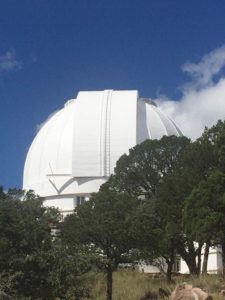3 Profound Lessons from the McDonald Observatory
by Liz Jansen
 My recent trip east from Los Angeles to Atlanta became a race against time, aiming to reach safe harbor in Georgia ahead of Hurricane Michael. The relatively leisurely pace I envisioned was tossed to the wind as I followed Interstate 10 across California and Arizona into Texas. I could not, however, pass by Fort Davis, Texas without stopping for a tour at the McDonald Observatory.
My recent trip east from Los Angeles to Atlanta became a race against time, aiming to reach safe harbor in Georgia ahead of Hurricane Michael. The relatively leisurely pace I envisioned was tossed to the wind as I followed Interstate 10 across California and Arizona into Texas. I could not, however, pass by Fort Davis, Texas without stopping for a tour at the McDonald Observatory.
According to their website, this research unit of The University of Texas is one of the world’s leading centers for astronomical research, teaching, public education, and outreach.
For three weeks I’d connected with the energy of the land as I traveled west across plains, over mountains, and along valleys paralleling the Pacific. A visit to the observatory offered time to gaze skyward and connect with the heavens.
Powerful telescopes sit atop Mount Locke and Mount Fowlkes under some of the darkest skies in the continental USA. Astronomers train their lens skyward, searching for planets, exploding stars, and black holes. Soon they’ll begin a project to better understand of dark energy.
We’re part of the same system, bound by the same universal laws, so it’s not surprising that in addition to the telescopes teaching me about stars, they taught me about myself.
3 Profound Lessons from the McDonald Observatory
Clouds Block Awareness
As powerful and state-of-the-art as these telescopes are, a cloud floating across the viewing area blocks the connection with the universe. If rain threatens, the viewing window closes, which stops data collection and the decoding of light transmission.
Thoughts are often compared to clouds. They form, float through our consciousness, and dissipate. But these thoughts lead to judgments and interfere with our connection to each other, and true self, and the universe.
New Insights Come from Old News
As exciting as it is when astronomers decipher the messages in the light energy that arrives from far away, it’s old news. By the time light from the edge of the universe arrives at the telescope, it’s traveled 46.1 billion light years to tell us about galactic events that happened 13.8 billion years ago. That’s very old news, but the best we’ve got.
As humans, we also operate on old news, except we’re usually unaware of it. Our thoughts and beliefs are based on stories that have been passed down through the generations. They form the basis for life choices. It’s only when we explore and question what we’ve accepted as fact that we begin to see that there are other perspectives. We learn that we’re working with data that served our ancestors, or us, at one time, but is no longer relevant.
Awareness Comes from Darkness
Data from the forefront of research arrives from darkness. Astronomers at the McDonald Observatory collect their information primarily at night as sunlight would damage the telescope’s lenses.
We learn most by exploring our shadows—the parts of ourselves we deny or repress, the wounds where we hide hurt, or the aspects of our self we dislike or disown. As hidden as they may be, these qualities inform our thoughts, choices and beliefs. They draw energy, diverting it from creativity and our search for happiness.
By becoming more aware, we see that maybe things aren’t the way we thought they were. Only through deep exploration of our inner space that we discover these aspects, learn to give them a constructive expression, and free the blockages that keep us from expressing our full potential.
A skilled healer is invaluable in facilitating this process. Contact me if you’re interested in learning more.

Great insight Liz. You truly are a gifted writer!
Thank you Penny. Our motorcycles deliver us to remarkable and unpredictable insights.
Liz, this gave me plenty to think about. . .I would like to hear more about this: “. . .we begin to see that there are other perspectives. We learn that we’re working with data that served our ancestors, or us, at one time, but is no longer relevant.”
Did you get my book in the mail?
Hi Gary – Thanks. I got it just before I left. It’s waiting for me when I get home.
Love this. Metaphors lead us to the truth. Thank you.
Thanks Colleen. It was such a visceral experience!